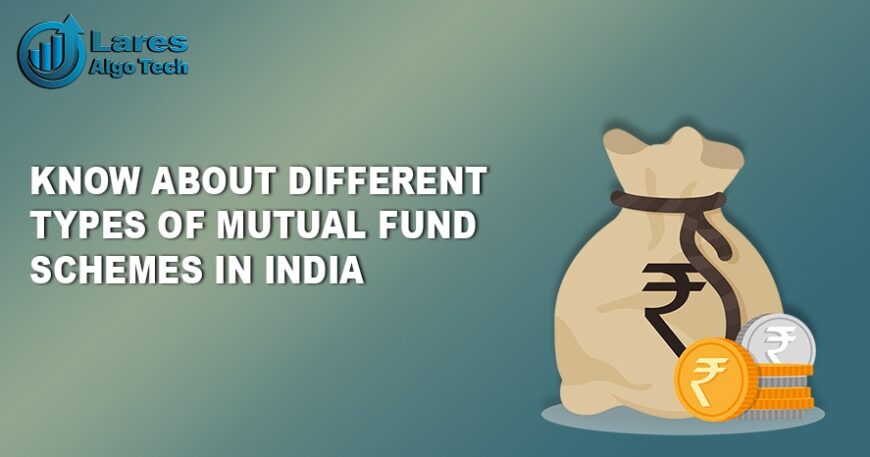Mutual funds are one of the most popular investment options in India, as they offer a variety of benefits such as diversification, professional management, liquidity, tax efficiency, and convenience. However, not all mutual funds are the same, and there are different types of mutual fund schemes that cater to different investors’ needs, goals, risk appetite, and time horizon. In this blog post, we will explain the different types of mutual fund schemes in India and how to choose the best one for you.
What are Mutual Funds?
Mutual funds are pooled investment vehicles that collect money from various investors and invest it in a portfolio of securities such as stocks, bonds, money market instruments, gold, etc. The portfolio is managed by a fund manager who decides which securities to buy and sell, based on the fund’s objective and strategy. The investors share the profits or losses of the fund in proportion to their investment amount. The fund also charges a fee for its services, which is deducted from the returns.
Different Types of Mutual Fund Schemes in India

There are many types of mutual fund schemes in India, but the most common ones are based on the following criteria:
- Asset Class: This refers to the type of securities that the fund invests in, such as equity, debt, hybrid, or gold.
- Structure: This refers to the mode of investment and redemption of the fund, such as open-ended, close-ended, or interval.
- Investment Objective: This refers to the goal and strategy of the fund, such as growth, income, value, dividend, etc.
- Risk Profile: This refers to the level of risk and volatility involved in the fund, such as low, moderate, or high.
Based on Asset Class
Equity Funds
Equity funds are the types of mutual fund schemes in India that invest predominantly in stocks or equity-related securities. They aim to provide capital appreciation and growth over the long term. Equity funds are suitable for investors who have a high-risk appetite and a long-term investment horizon. Equity funds can be further classified into sub-types based on the market capitalization, sector, theme, style, or geography of the stocks they invest in.
Some examples of equity fund sub-types are:
- Large Cap Funds: These funds invest in the stocks of large and well-established companies that have a high market capitalization. They tend to be less volatile and more stable than other equity funds, but they may also offer lower returns.
- Mid Cap Funds: These funds invest in the stocks of medium-sized companies that have a moderate market capitalization. They tend to be more volatile and risky than large-cap funds, but they may also offer higher returns.
- Small Cap Funds: These funds invest in the stocks of small and emerging companies that have a low market capitalization. They tend to be the most volatile and risky among equity funds, but they may also offer the highest returns.
- Sector Funds: These funds invest in the stocks of a specific sector or industry, such as banking, IT, pharma, FMCG, etc. They aim to benefit from the growth potential and opportunities of that sector. They are exposed to sector-specific risks and challenges. They are suitable for investors who have a strong conviction and knowledge about that sector and can tolerate high risk.
- Dividend Yield Funds: These funds invest in the stocks of companies that pay high and regular dividends. They aim to provide income and capital appreciation by investing in such stocks.
- Index Funds: These funds invest in the stocks that constitute a specific index, such as Nifty 50, Sensex, etc.
- Exchange Traded Funds (ETFs): These funds are similar to index funds, but they trade on the stock exchange like stocks. They offer the benefits of both mutual funds and stocks, such as diversification, liquidity, transparency, etc. They tend to have low costs and low risks, as they do not involve active management or stock selection. They are suitable for investors who seek passive and low-cost investing.
Debt Funds
Debt funds are types of mutual fund schemes in India that invest predominantly in fixed-income securities such as bonds, debentures, treasury bills, commercial papers, etc. They aim to provide regular income and capital preservation over the short to medium term. Debt funds are suitable for investors who have a low to moderate risk appetite and a short to medium-term investment horizon. Debt funds can be further classified into sub-types based on the maturity, credit quality, or type of fixed-income securities they invest in.
Some examples of debt fund sub-types of mutual fund schemes in India are:
- Liquid Funds: These funds invest in very short-term debt securities that have a maturity of up to 91 days. They aim to provide high liquidity and low risk by investing in high-quality and low-duration instruments.
- Ultra Short Duration Funds: These funds invest in short-term debt securities that have a maturity of 3 to 6 months. They aim to provide higher returns than liquid funds by investing in slightly longer-duration and lower-quality instruments.
- Low Duration Funds: These funds invest in short-term debt securities that have a maturity of 6 to 12 months.
- Money Market Funds: These funds invest in money market instruments such as treasury bills, commercial papers, certificates of deposit, etc. that have a maturity of up to 1 year.
- Short Duration Funds: These funds invest in debt securities that have a maturity of 1 to 3 years.
- Medium Duration Funds: These funds invest in debt securities that have a maturity of 3 to 4 years.
- Medium to Long Duration Funds: These funds invest in debt securities that have a maturity of 4 to 7 years.
- Long Duration Funds: These funds invest in debt securities that have a maturity of more than 7 years.
- Dynamic Bond Funds: These funds invest in debt securities of various maturities and credit qualities.
- Corporate Bond Funds: These funds invest in debt securities issued by corporations or private sector entities.
- Banking and PSU Funds: These funds invest in debt securities issued by banks and public sector undertakings.
Based on Structure
The classification types of mutual fund schemes in India based on structure are as follows:
- Open-Ended Funds: These funds allow investors to buy or sell units at any point in time. They do not have a fixed maturity date or a fixed number of units. They are suitable for investors who want to invest and withdraw their money flexibly and at net asset value (NAV) related prices.
- Close-ended Funds: These funds have a fixed maturity period and a fixed number of units. The key feature is lock-in. They are suitable for investors who want to invest for a fixed term and can tolerate market price fluctuations.
- Interval Funds: These funds operate as a combination of open and close-ended funds. They allow investors to trade units at predefined intervals. They may be traded on the stock exchange or they may be open for sale or redemption during pre-determined intervals at NAV-related prices.
Benefits of Investing in Different Types of Mutual Fund Schemes in India
Investing in different types of mutual fund schemes can offer various benefits to investors, such as:
- Diversification: Investing in different types of mutual fund schemes can help investors diversify their portfolios across various asset classes, sectors, themes, geographies, etc. This can reduce the overall risk and enhance the overall return of the portfolio.
- Professional Management: It can help investors benefit from the expertise and experience of the fund managers who manage the funds. The fund managers conduct research and analysis, select the best securities, monitor the performance, and make timely changes in the portfolio to achieve the fund’s objective.
- Liquidity: It can help investors enjoy liquidity, as they can buy or sell their units at any time (except for close-ended and interval funds). They can also redeem their units at the prevailing NAV, subject to exit load, if any.
- Flexibility: It can help investors enjoy flexibility, as they can choose from a wide range of schemes that suit their needs, goals, risk appetite, and time horizon.
- Affordability: It can help investors enjoy affordability, as they can start investing with a small amount of money. They can also invest through systematic investment plans (SIPs).
- Tax Efficiency: Investing in different types of mutual fund schemes can help investors enjoy tax efficiency, as they can avail of various tax benefits depending on the type of scheme.
How to Choose the Best Type of Mutual Fund Scheme for You?
Choosing the best types of mutual fund scheme in India depends on several factors, such as:
- Your Investment Objective: You should choose a mutual fund scheme that matches your investment objective, whether it is capital appreciation, income generation, tax saving, or retirement planning.
- Your Risk Appetite: Choose a mutual fund scheme that suits your risk appetite, whether it is low, moderate, or high.
- Your Investment Knowledge: You can choose a mutual fund that matches your investment knowledge, whether it is basic, intermediate, or advanced.
- Your Investment Cost: You should choose a mutual fund scheme that minimizes your investment cost, whether it is expense ratio, exit load, or tax implications.
By considering these factors, you can choose the best type of mutual fund scheme for you that meets your needs, goals, and preferences. You can also use online tools such as mutual fund calculators or mutual fund comparisons to compare and analyze different mutual fund schemes and select the best one for you. You can also consult a financial advisor or planner who can guide you in choosing among the different types of mutual fund schemes based on your profile and requirements.





